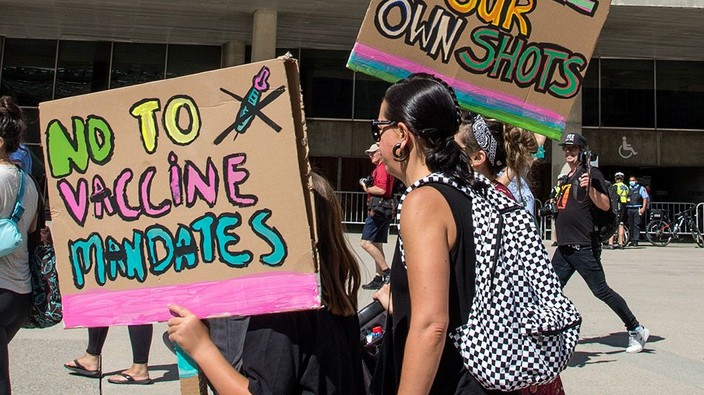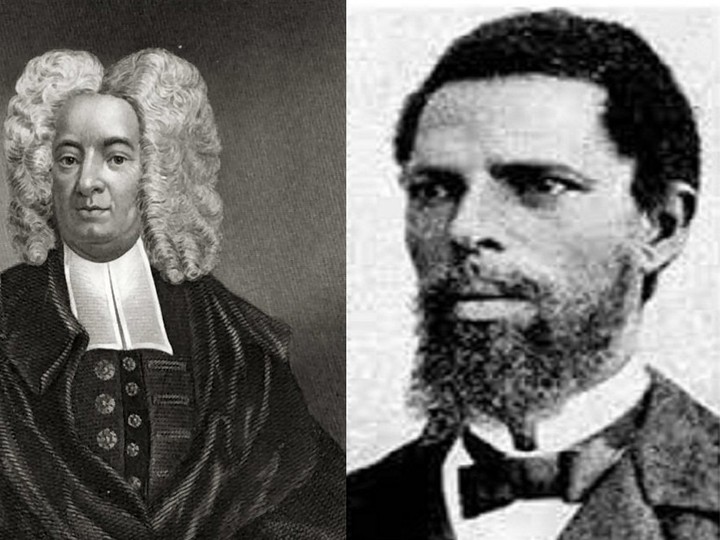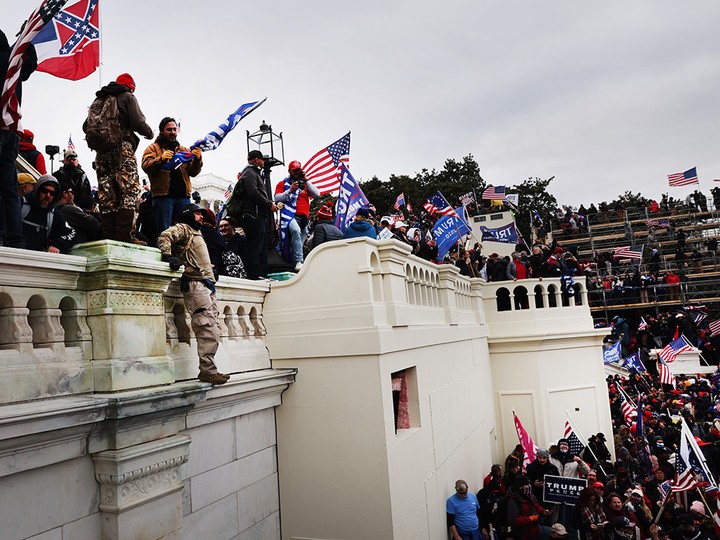the history of anti-vaccine beliefs and conspiracy theories
anti-vaccine sentiment has even been part of popular culture in the not-so-distant past.

protesters against ontario's incoming 'vaccine passport' at toronto city hall on sept. 1, 2021.
peter j. thompson
/
national post
by: dalson chen“no jab,” declared a sign — one of many at a recent protest on windsor’s riverfront where hundreds of people expressed fear, suspicion, and outright denial of covid-19 vaccines.“jesus is the vaccine,” proclaimed a different sign. another sign likened vaccine mandates to nazism, with those who refuse vaccination comparable to holocaust victims.yet another sign warned that the pandemic and vaccination efforts are part of an orchestrated “genocide” campaign.the sign didn’t specify who is masterminding the conspiracy.for thousands of windsor-essex residents who have received at least one dose of covid-19 vaccine — almost 80 per cent of the region’s entire population, ages 12 and older — such proclamations and accusations may seem outlandish, irrational.yet the fears persist. the bizarre theories abound. and those who believe in them seem more intractable — and more vocal — than ever.

“all of this is fuelled by anxiety and resentment,” says richard moon, a law professor at the university of windsor who has been monitoring the public response to the covid-19 pandemic, including the rise of conspiracy theory believers.while those who oppose vaccination are in the minority, the social media era seems to provide ample support and reinforcement for what moon describes as “disturbing, unfounded points of view.”as for the claims that vaccine mandates infringe on individual rights and are tantamount to discrimination, moon is dismissive. from a legal perspective, he considers such arguments to “have no substance, really.”“i firmly believe that the courts would make short work of these challenges. they really are unfounded, and would hopefully be dismissed pretty quickly,” moon says.more often than not, wielding of the canadian charter of rights and freedoms in such a manner is an attempt “to shut down public policy conversation,” moon says.“they can’t win the public policy argument. that’s pretty clear. vaccinations are good, important, and will be the only way we get out of this pandemic situation.”of course, vaccine hesitancy isn’t a new thing. according to statistics canada, during the h1n1 pandemic of the 2009 to 2010 flu season, only 41 per cent of canadians actually received the h1n1 vaccine — despite the world health organization declaring h1n1 a public health emergency of international concern.in 2000, ontario began the world’s first universal influenza immunization program. and yet the program’s participation rate in the 2013 to 2014 flu season was only 34 per cent — a significant decline from where it had been a decade previous.

advertisement
anti-vaccine sentiment has even been part of popular culture in the not-so-distant past. former playboy playmate jenny mccarthy, under the influence of the writings of dr. andrew wakefield, famously blamed mmr vaccines (measles, mumps, and rubella) for her son’s autism. she said so in multiple television interviews and media appearances.wakefield’s work has since been thoroughly discredited and disproven. the lancet — the u.k. medical journal that published his original controversial paper in 1998 — completely retracted the paper in 2010.the same year, the u.k. general medical council found wakefield guilty of ethical violations, dishonesty, and irresponsibility in his research.wakefield was removed from the u.k. medical register. the next year, the british medical journal published a series of investigative articles on wakefield that revealed manipulated data, falsifications, and deliberate fraud in his 1998 paper.jenny mccarthy has since stated in interviews that she is “not anti-vaccine,” and that she is in a “grey zone” on the subject of vaccination.“but by that point, the damage had been done,” says allison meek, an associate professor of history at king’s university college at the university of western ontario.“and (the damage) is growing. it’s tapping in today to the health food movement, the organic movement, the natural life/homeopathic movement.”meek has been examining public reaction to the covid-19 pandemic from an historical perspective. while there’s certainly been no shortage of anti-vaccine sentiment in the past 20 years, she says we can go back over 100 years and still find more.

advertisement
according to meek, there were widespread organized efforts against vaccination in the late 1800s, in the form of anti-vaccination societies.these grassroots groups — often involving religious leaders — preached notions and slogans that wouldn’t have looked out of place on the placards that filled windsor’s riverfront last weekend.“the phrase that was used was ‘bodily autonomy,’” meek says. “that god had created your body the way that he intended, and so you are not to inject foreign substances into your body.”the internet wasn’t necessary for the message of anti-vaccination societies to proliferate. from church services and afternoon teas, to magazines and pamphlets, to public speeches and community hall gatherings — multiple means were used to influence people and make them nervous about vaccines.“the scale was much different than what it is today. but it was effective,” meek says.

anna muldoon, a researcher in public health at arizona state university and a co-author of the book covid-19 conspiracy theories, says we can find precedents for anti-vaccine thinking as far back as when inoculation was first being discovered by medical science.although the basis for modern day vaccination is largely credited to the work of english physician and scientist edward jenner — particularly in 1796, when he was seeking a solution to smallpox — he was pre-dated by cotton mather, a puritan minister in boston, who studied inoculation methods as early as 1721.according to muldoon, cotton mather learned about a crude way of inoculating people from his african slave: a black man named onesimus.onesimus taught mather that a person could be protected from smallpox by deliberate infection. material from the pustules of a smallpox patient would be inserted into a small cut on the arm of the inoculation subject.the resulting infection would be less severe than naturally acquired smallpox, and would still induce immunity in the subject.

advertisement
at the time, the people of boston were terrified of smallpox. but mather’s advocacy of inoculation via small cuts was more terrifying — on both a physical level and a metaphysical one.“a lot of people believed that humans interfering in a smallpox outbreak was an attempt to avoid god’s punishment for sin,” muldoon says. “inoculation… was human interference in the divine plan.”mather’s work was viewed as so blasphemous that one protester tried to set mather’s home on fire with a makeshift bomb thrown through a window.muldoon says there was a note attached that read: “i’ll inoculate you with this.”even mather had his misgivings due to his religious beliefs. muldoon says mather’s diaries reveal that as he promoted inoculation to the public, he was arguing with himself about it from a theological perspective. was it wrong to use human intelligence to prevent god’s punishment?“obviously, he ended up coming down on the side of human intelligence… but he didn’t get there instantaneously,” muldoon says.

in her writings for the book covid-19 conspiracy theories, muldoon suggests that the profound influence of religion on public responses to pandemics can be traced not just centuries ago, but thousands of years ago — to ancient times.“pretty much for as long as disease has existed, humans have had explanations for it that blame others,” muldoon says.“whether the explanations are mythological or religious or conspiracy-based, people have tried to make sense of disease as a punishment for some social failing… that has really been interestingly consistent.”perhaps fear of vaccination is rooted in “some really deep human concerns about our bodies, and our safety, and bodily integrity, that i’m not sure have changed much over time,” muldoon wonders.

advertisement
but that doesn’t explain why some in the current anti-vaccine movement are gladly putting other things in their bodies to supposedly guard against covid-19 — such as ivermectin, the parasite medication commonly given to horses as a heart dewormer.touted by misinformation on social media, the idea is that ivermectin in high enough doses has an antiviral effect.such doses go beyond the maximum approved amounts of ivermectin for humans.why would someone worried about “bodily integrity” trust a risky, unproven, under-studied therapy over vaccines that have been legitimately researched and advocated by public health professionals?“one thing that we now know is that people can become immersed in a social media bubble, in which the same or similar views are constantly being put forward and reinforced,” says richard moon.“you become surrounded, in this social media world, by posts and comments that share your sympathies — and that is what you come to trust… you feel a kind of loyalty towards them, a sense of tribe.”“there’s a real psychology that develops on social media… and it is something that has, in fact, been promoted. a big part of the process has been to erode and undermine the trust in historically more reliable institutions and sources of information.”“i think we’ve now discovered that social media has very significant drawbacks that we did not anticipate”

advertisement
in the realm of online conspiracy theories, nothing seems too wild. vaccinations could be part of a master plan by billionaire bill gates to insert trackable microchips into people. 5g cellular networks could be the cause of the novel coronavirus. your dna could be impacted by covid-19 vaccines.one windsor business owner’s social media posts include the assertion that vaccines of any kind are a long-term plot by the entire medical industry to undermine public health on a massive scale, thus ensuring lifetime dependency on doctors.“this is sabotage,” he warns. “they are sabotaging you… they are creating a dynamic so that in the next 10 or 20 years, you’re gonna keep coming back to them for drugs.”“this is how they work. they get you when you’re young. now it’s embedded in your genetic code. the genetic code then starts to manufacture these things in the body, and you’re going out and buying all kinds of stuff to negate what was done to you as a child.”john bodner, an associate professor of social cultural studies at the grenfell campus of memorial university in newfoundland, has been studying covid-19 conspiracy theories from a unique perspective: that they’re a kind of folklore.“they belong to a grouping of genres and narratives that are related to rumour and contemporary legend,” says bodner, who is also a co-author of the book covid-19 conspiracy theories.“you know: the alligators in the sewer, the call is coming from inside the house — stories like that.”

advertisement
according to bodner, conspiracy theories can be seen as “part of the way that human communities have historically tried to process ambiguous events.”“obviously, a pandemic is going to be an ambiguous event that causes stress and strain.”so perhaps conspiracy theories, as audacious as they can be, are a predictable human psychological response.but that’s not to say they’re harmless.one only needs to look at the capitol riots in washington, d.c., in january to see the real world consequences of commitment to conspiracy theories.many participants in the capitol riots were driven by their belief in the “qanon” super conspiracy, which postulates a secret cabal of unelected power holders in the u.s. government — the deep state — is being challenged and exposed by donald trump.also, this deep state is ruled by blood-drinking pedophiles.

bodner likens “qanon” to the “satanic panic” of the 1980s: the tidal wave of moral concern among parents 40 years ago that their children were being subliminally recruited for satanic ritual abuse through heavy metal music and album covers, horror movies, and fantasy role-playing games like dungeons and dragons.“the idea that there were satanists roaming around the countryside imperilling our children was a curious moment to live through,” bodner reflects.“but it really shows you the enduring quality of these stories, and how pernicious they can be.”the biggest difference between now and 40 years ago, of course, is the power of the internet. it’s never been easier to propagate baseless and harmful ideas.“you can consume a conspiracy theory through a meme — like, just an image,” bodner marvels. “you can consume a conspiracy theory through a cute little infographic, or a youtube video.”according to a survey by the internet-based market research company yougov, as much as 28 per cent of u.s. respondents consider the bill gates microchips-in-vaccines conspiracy theory to be credible.with all that in mind, is it any wonder that some people are convinced horse-sized doses of heart dewormer are a better covid-19 solution than getting vaccinated?

advertisement
“a scientist wrote recently… that the difference between conspiracy theories and scientific theories is that scientific theories tell you what the limits of them are,” bodner says.“(scientists) actually try to say, ‘this is the extent of what i can explain with my theory.’ and they always have the possibility that it can be disproven.”“the problem with conspiracy theories is that they purport — and exclaim — that they have explained everything.”richard moon says he’s often startled by the amount of rage that can accompany belief in conspiracy theories. but understanding the emotions behind such positions could be important to bridging differences and moving forward.“people have challenges in their lives, they have frustrations. and this stuff provides a channel for it,” moon says.“when things go wrong, people seem to feel comfort, in a strange way, in imagining that there have been bad actors who have conspired and plotted the situation.”“it’s preferable to realizing that things can go wrong accidentally, or naturally.”
 10 minute read
10 minute read





